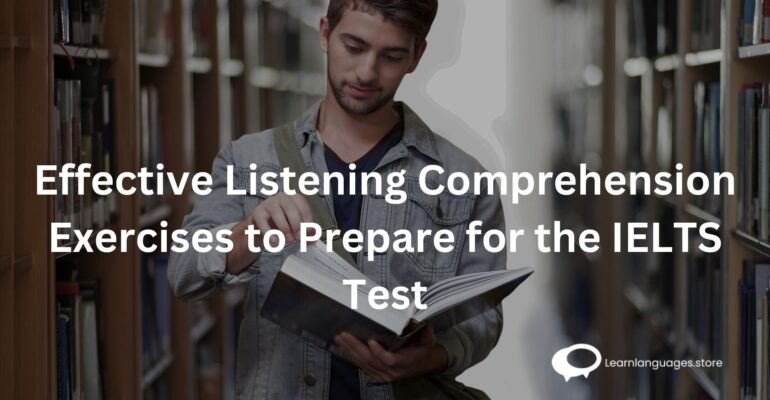Effective Listening Comprehension Exercises to Prepare for the IELTS Test
Effective Listening Comprehension Exercises to Prepare for the IELTS Test
Introduction
The International English Language Testing System (IELTS) is a significant hurdle that non-native English speakers have to cross to prove their proficiency in English. It’s an essential requirement for studying, working, or migrating to English-speaking countries like the UK, Australia, Canada, New Zealand, and the USA.
Overview of the IELTS Test
The IELTS exam is segregated into four components: Reading, Writing, Speaking, and Listening. Each of these sections carries equal importance and contributes to your overall score. The Listening portion is 30 minutes long and includes 40 questions spread over four sections. As this portion is common to both IELTS Academic and General versions, it’s crucial to master this skill irrespective of the test type you opt to take. The range of accents you’ll hear in this part of the test includes British, American, Australian, Canadian, and New Zealand, providing a comprehensive understanding of English as it is spoken worldwide.
Importance of Listening Comprehension in the IELTS Test
Listening comprehension is often overlooked, though it plays a vital role in the IELTS test:
– It tests your ability to comprehend English as it is spoken in various accents and dialects.
– It evaluates how effectively you can follow and understand the gist of conversations or monologues.
– It demonstrates your capacity to pick up specific information like facts, opinions, and speaker’s purpose.
With these crucial aspects in play, honing your listening skills can indeed make a difference in your overall IELTS score. And what’s the best way to improve these skills? By undertaking targeted exercises designed to boost your listening comprehension in the unique IELTS format.
Understanding the IELTS Listening Test Format
The International English Language Testing Systems, popularly known as IELTS, features a listening section that requires both focus and comprehension. With four recorded conversations and monologues that reflect real-life situations, you need to grasp key details, opinions, and the main idea of each dialogue.
Overview of the Listening Test Sections
The listening test is divided into four sections, each with a different skill focus:
– Section 1: This section usually includes a conversation between two individuals on a social or service-related topic, like planning a trip.
– Section 2: In this section, you’ll hear a monologue about a public situation such as an event announcement or a guide on a tour.
– Section 3: Usually involves up to four people discussing an educational or training-related topic.
– Section 4: This concluding part features an academic style monologue, for example, a university lecture.
Types of Questions in the Listening Test
As part of your IELTS listening preparation, familiarity with the types of questions is key. The questions come in different formats such as:
– Multiple choice questions
– Matching (matching phrases or ideas to the speaker, for instance)
– Plan/map/diagram labelling
– Form/note/table/flow-chart/summary completion
– Sentence completion
– Short-answer questions
Each of these question styles aims at evaluating your different aspects of listening abilities. Having an idea of what to expect puts you well ahead of the game. Practicing these kinds of exercises frequently will boost your confidence and performance in the actual test.
Effective Listening Comprehension Strategies
Developing effective listening comprehension strategies is a fundamental principle to succeeding in the IELTS listening test. This section will guide you on how to enhance the two crucial components of listening comprehension – active listening and note-taking.
Active Listening Techniques
Active listening involves fully engaging with what is being said, rather than just passively hearing the words. For the IELTS test, it’s about focussing on understanding the speaker’s idea, not just isolated words or phrases. Here are some strategies that you can practice:
– Try to predict the speaker’s next point. This helps you stay engaged and mentally ready to absorb new information.
– Listen for keywords or phrases that often signal major points or changes in the topic.
– Don’t get stuck on a word or phrase you didn’t understand. Instead, keep listening for the overall meaning.
Note-taking Tips During the Listening Test
Taking notes during the listening test can be your lifeline, especially with the amount of information being presented. Here are some note-taking tips:
– Use abbreviations and symbols wherever you can. This will save time and enable you to capture more information.
– Write down only essential information like names, dates and major concepts, not every detail you hear.
– Practice listening and writing at the same time. It may be challenging, but it’s a skill that will definitely pay off in the test.
These advanced strategies for active listening and note-taking will significantly enhance your IELTS Listening Comprehension abilities.
Sample Listening Comprehension Exercises
To prepare for the IELTS test, consolidating your understanding of the journey ahead is an essential step. Here, we lay out some practical listening comprehension exercises designed to mirror the IELTS test format, helping you build your listening skills.
Exercise 1: Mapping and Labeling
This is one of the most challenging tasks in the IELTS Listening test due to its demand for high attention to detail. You are required to listen to the audio and draw or label a map as per the information provided.
– Begin by practicing with simple maps or diagrams.
– Gradually, increase the complexity by including more landmarks or points of identification.
– Make sure to pay close attention to prepositions and directional language.
– Practice your spelling. Each error made in spelling is marked as a wrong answer in the IELTS test.
Exercise 2: Multiple-choice Questions
Multiple-choice questions test your ability to understand the main idea, specific details, or an opinion from the listening text.
– Start by reading the questions before the audio begins. This will give you a brief overview of what to listen for during the recording.
– While practicing, try eliminating wrong choices to make the answering process easier.
– Pay particular attention to paraphrasing. Often, the sentence in the question will not be an exact match to what you hear in the audio.
Exercise 3: Sentence Completion
The key challenge in Sentence Completion tasks lies in identifying the correct information from the audio file and effectively filling in the gaps accurately.
– Practice listening for synonyms and paraphrases. The words on the question sheet often aren’t the exact words used in the recording.
– Keep a keen ear for numbers, dates, and times since these details frequently come up in this type of exercise.
Exercise 4: Matching Information
This exercise is designed to test your ability to identify specific information in the listening text.
– A practical technique here is to scan the options and identify unique words.
– Understand that the answer options may not follow the order of the listening excerpts.
Exercise 5: True/False/Not Given Questions
This type of question requires you to identify if a statement agrees (True), disagrees (False), or whether the information is not mentioned in the recording (Not Given).
– Focus on understanding the entire context of what’s being said.
– Be cautious of distractors or contradictions during the test.
In conclusion, these preparatory exercises are invaluable tools to hone your listening skills for the IELTS exam. Remember, the key to testing success is practice, patience, and preparedness. Happy studying!
Tips for Practicing Listening Comprehension Exercises
When preparing for your IELTS exam, honing your listening comprehension skills is vital. Here are several effective tips for practicing listening comprehension exercises, that can guide you on your journey to acing the IELTS.
Find reputable IELTS preparation resources
The first step is to locate quality IELTS preparation resources. This could be anything from books, online courses, practice tests or study guides that provide actual exam-like material. Some highly recommended sources for IELTS practice include the British Council IELTS website, the IELTS Online Tests, and the Cambridge IELTS series of books. Let’s not forget mobile apps like IELTS Prep App or IELTS Skills which are wonderful for on-the-go studying! It’s important to:
– Routinely check for updated resources. The IELTS test format and content occasionally change, so make sure your study materials are current.
– Select resources that provide not only answers but also explanations and strategies on how to approach the tasks. This can revolutionize your preparation process.
Develop a study plan and schedule regular practice sessions
The key to mastering any skill and more so for honing your IELTS listening comprehension is through consistent practice. Develop a study plan that suits your routine and commit to regular practice sessions.
– Decide on a comfortable pace and stick to it. Don’t rush through your practice sessions; understanding is far more crucial than speed.
– Test yourself under timed conditions occasionally to simulate actual exam circumstances. This can help with time management, a critical element in the IELTS.
– Reflect on your mistakes. Learning from your errors is an essential part of progress.
Remember, acing the IELTS test requires not only understanding the test format, but also consistent, dedicated practice and a good grasp of English comprehension.
Other Resources for Improving Listening Comprehension Skills
In addition to doing specific IELTS listening comprehension exercises, you can also use other resources to help you prepare for the test. These resources are not only helpful for your exam prep, but they can also be quite enjoyable, making your learning process interesting and fun.
Listening to English podcasts and audiobooks
One of the best ways to improve your listening comprehension skills is by listening to English podcasts and audiobooks.
– Select themes that you enjoy. The more entertained you are by the content, the more motivated you will be to listen.
– Try to challenge yourself with advanced-level material, but don’t get overwhelmed. Go at your own pace.
– Use short sections to practice active listening. This involves full concentration, understanding, and response to the material.
Regularly integrating podcasts and audiobooks into your routine can significantly improve your English listening skills and prepare you for the IELTS listening section.
Watching English movies and TV shows with subtitles
Watching movies and TV shows in English with subtitles is another great way to improve your listening comprehension.
– Choose shows or movies in a genre that you’ll enjoy. This not only keeps it fun, but can also introduce you to various dialects and accents.
– Watch first with subtitles, then try removing the subtitles for an added challenge.
This method supports your ability to understand spoken English in various contexts, mirroring the diverse accents you may encounter in the IELTS test.
Practicing listening comprehension with native speakers
Finally, nothing beats real-life interaction for improving your English listening comprehension.
– Find opportunities to converse with native English speakers. This could be through language exchange programs or international social events.
– Don’t be afraid to ask others to repeat or slow down.
– Practice active listening by summarizing their points and asking relevant questions.
By doing so, you’ll not only hone your English listening skills but also gain a deeper cultural understanding and build your confidence.
Common Mistakes to Avoid in the Listening Test
As part of your IELTS preparation, it’s crucial to understand what not to do during the listening section of the test. Here are a couple of common mistakes many individuals make, which you should strive to avoid.
Not Reading the Instructions Carefully
It might seem like a basic tip, but an alarming number of test-takers lose valuable marks simply because they don’t read the instructions carefully. Some of the repercussions of this are:
* Answering a different question than the one asked
* Writing more or fewer words than requested
* Misunderstanding the task completely
Always take the time to fully understand what is required of you for each question. Remember, every mark counts!
Focusing Too Much on Individual Words Instead of Overall Meaning
Another common mistake is getting hung up on individual words, especially difficult or unfamiliar ones. It’s essential to understand that the IELTS test is not just about vocabulary. It tests your ability to comprehend English in various contexts. Wasting time trying to figure out individual words might cause you to:
* Lose track of the overall conversation or monologue
* Miss crucial information
* Fail to grasp the general meaning of what is being said.
Instead, focus on the broader meaning, and don’t let unknown words throw you off track. As you prepare for the exam, practice extracting the main ideas from audio content despite any vocabulary hurdles you encounter.
Final Tips for Effective Listening Comprehension Preparation
In order to ace the IELTS, you have to prepare decisively with an effective strategy. Aside from the exercises that we have already discussed, here are some additional tips for effective listening comprehension preparation.
Time Management during the Listening Test
One of the major challenges you may face during the IELTS listening exam is time management. With the test lasting about 40 minutes and 40 questions to answer, you need to be swift yet accurate. Here are a few tips:
– Avoid getting stuck: If you are unable to understand something, don’t spend much time on it. Move on to the next part.
– Review if time permits: Only go back to confusing parts if you have spare time once you have gone through all the sections.
Maintaining a Positive Mindset
Your attitude towards the test plays a crucial role in your success. It’s normal to feel a bit nervous before it, but remember, you have prepared well.
– Stay confident: Remind yourself of the prep work you have done. Your hard work will help you prevail.
– Relax before the test: Take time to relax before your exam— read a book, listen to music or do a light exercise.
– Believe in yourself: It’s not just about the test; it’s about communicating effectively in English. Keep your ‘why’ in mind and tackle the test with positivity.
With these tips and exercises under your belt, you’re sure to excel in the IELTS listening test.
Conclusion
Well, my friends, we’ve made quite the journey together exploring effective ways to master listening comprehension for the IELTS exam. Let’s reel it back in and highlight some fundamental points we’ve covered off.
Summary of key points
Several efficient tips and exercises can help you boost your listening skills for the IELTS. Let’s recap:
• Understanding the IELTS test format: Recognizing the type of content you are expected to listen to and the types of questions that can be asked is a powerful foundation for your training.
• Practice with similar exercises: The closer your practice exercises are to the actual test, the more comfortable you’ll be on the day of the exam.
• Expanding vocabulary: Learning new words and their contexts is a must. It helps understand conversations and monologues better.
• Prepare for accents: The IELTS test covers a wide variety of English accents like American, Australian, and British. Familiarizing yourself with these accents can be a gamechanger.
Importance of consistent practice for improved listening comprehension skills.
Finally, remember, Rome wasn’t built in a day. The same applies to your IELTS preparation. Consistent practice is crucial for making significant strides in your listening skills. Make it a routine to listen to English language podcasts, watch films or news broadcasts, and practice test exercises regularly. Over time, this consistent exposure and practice will increase your confidence and ensure that you’re ready to take that exam head-on. You’ve got this, friends! Until next time, happy studying!
Learn Languages Store
Vashi,
Email: services@learnlanguages.store










